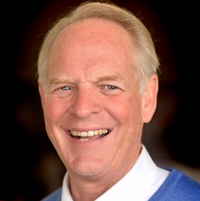By Bob Allen
Calvinist-inclined Baptists and Presbyterians attending this year’s upcoming national conference of the Gospel Coalition are adding a place at the table for a new constituency: conservative Anglicans who have broken with the Episcopal Church.
Joining mainstays like Danny Akin, Mark Dever, Albert Mohler and Russell Moore scheduled to speak at the April 13-15 gathering in Orlando, Fla., is John Yates II, rector of The Falls Church Anglican in suburban Washington.
Other Anglican leaders are offering seminars and workshops at the Gospel Coalition 2015 National Conference, and there will be an informal gathering one evening for Anglicans to come together for fellowship and encouragement, Yates said in a Gospel Coalition blog titled “Who Are These Anglicans in TGC?”
 Established by English settlers in the 1700s, Yates’ church left the Episcopal Church in 2006 to become active in the newly formed Anglican Church in North America, a group of breakaway congregations that differ with Episcopalian leaders over issues of sexuality and salvation.
Established by English settlers in the 1700s, Yates’ church left the Episcopal Church in 2006 to become active in the newly formed Anglican Church in North America, a group of breakaway congregations that differ with Episcopalian leaders over issues of sexuality and salvation.
“While the Episcopal Church in the United States has gradually self-destructed over the last 40 years, a decidedly Reformed and evangelical movement has matured and found expression in parts of ACNA,” Yates explained.
Yates said a number of both former Episcopalians who are rediscovering the beauty of Anglican worship and other Christians who are discovering it for the first time have “been surprised by the strong Reformation doctrines that permeate the Book of Common Prayer.”
Albert Mohler, a member of the Gospel Coalition council who serves as president of Southern Baptist Theological Seminary in Louisville, Ky., has been criticized in recent days for saying the reason Southern Baptists are leaving for liturgical denominations like Anglicans and Catholics is the failure of churches to ground children in the fundamentals of evangelical faith.
Discussing a Wall Street Journal story on adults who switch their faith which featured twin brothers who were raised Southern Baptists — one is now an Anglican bishop and the other a Roman Catholic priest — Mohler noted that the shifts were of differing degrees.
“Becoming an Anglican doesn’t necessarily mean, in any sense, the denial of the very essentials of the gospel that would be at stake in terms of the official teachings of the Roman Catholic Church, in terms of those Reformation principles that we believe to be in the very heart of the gospel,” Mohler said in a March 6 podcast. “Of justification, by faith alone, by grace alone, by the work of Christ alone, knowable by the authority of Scripture alone, and ultimately to the glory of God alone.”
Joe Carter, communications specialist for the SBC Ethics and Religious Liberty Commission and listed as an editor on the Gospel Coalition staff, wrote a blog last year titled “9 Things You Should Know About Anglicanism.”
“The Anglican faith is often considered a reformed Catholicism, a hybrid between the Catholic and Protestant faiths,” Carter wrote. “For instance, one key dividing point between Anglicanism and Catholicism is the issue of absolute authority” of the pope.
The Gospel Coalition was founded in 2005 as a renewal movement for churches concerned about trends among evangelicals they believe depart from historic beliefs and practices.
The group’s confessional statement includes belief “that from all eternity God determined in grace to save a great multitude of guilty sinners from every tribe and language and people and nation, and to this end foreknew them and chose them.”
Another bedrock belief is that men and women, while equally made in the image of God, “are not simply interchangeable, but rather they complement each other in mutually enriching ways.” That is characterized in the home by husbands exercising “headship” and “the wife submitting to her husband” in a way that “ultimately serves as a type of the union between Christ and his church.”
And in worship: “The distinctive leadership role within the church given to qualified men is grounded in creation, fall and redemption and must not be sidelined by appeals to cultural developments.”
Yates is the currently the only Anglican among 54 members of The Gospel Coalition council, populated overwhelmingly by Baptists and Presbyterians.
Southern Baptist council members include Danny Akin, president of Southeastern Baptist Theological Seminary; Voddie Baucham, senior pastor of Grace Family Baptist Church in Spring, Texas; Mark Dever, senior pastor of Capitol Hill Baptist Church in Washington; and Darrin Patrick, lead pastor of The Journey in St. Louis.
Other council members included John Piper, founder and teacher of Desiring God ministries, and Ligon Duncan, chancellor and CEO of Reformed Theological Seminary who works with Mohler and Dever in a similar network called Together for the Gospel.
Former members of the Gospel Coalition include Mark Driscoll, a founding member who stepped down in 2012 when his ministry became embroiled in controversy including allegations of abusive and domineering behavior toward staff and of manipulating sales of his book Real Marriage to get it included on the New York Times bestseller list.
Driscoll resigned as pastor of the megachurch that he started, Mars Hill Church in Seattle, in October, and on Jan. 1 the church formally dissolved. This week the Seattle Post-Intelligencer reported that Driscoll will resurface this year at two summer conferences in Australia and London.
Another former Gospel Coalition member, C.J. Mahaney, a founder of Sovereign Grace Ministries, got derailed by both conflict within the church-planting network and a high-profile lawsuit accusing him and other SGM leaders of enabling and covering up child sex abuse.
Previous story:
SBC leader: Baptists, don’t let your babies grow up to be Catholics
